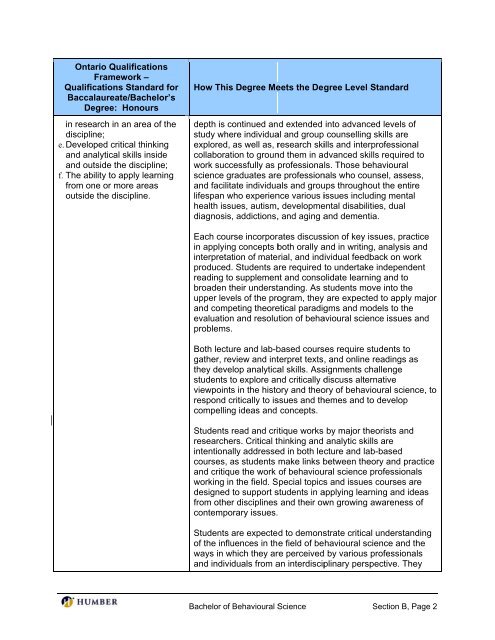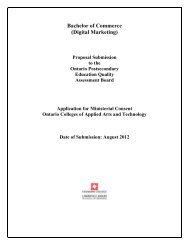Bachelor of Behavioural Science - Postsecondary Education Quality ...
Bachelor of Behavioural Science - Postsecondary Education Quality ...
Bachelor of Behavioural Science - Postsecondary Education Quality ...
Create successful ePaper yourself
Turn your PDF publications into a flip-book with our unique Google optimized e-Paper software.
Ontario Qualifications<br />
Framework<br />
–<br />
Qualifications Standard for<br />
Baccalaureate/<strong>Bachelor</strong>’s<br />
Degree: Honours<br />
in research in an area <strong>of</strong> the<br />
discipline;<br />
e. Developed critical thinking<br />
and analytical skillss inside<br />
and outside the discipline;<br />
f. The ability to apply<br />
learning<br />
from one or more areas<br />
outside<br />
the discipline.<br />
How This<br />
Degree Meets the Degree Level Standard<br />
depth is continued and extended into advanced levels <strong>of</strong><br />
study where individual and group<br />
counselling<br />
skills are<br />
explored, as well as, research skills and interpr<strong>of</strong>essional<br />
collaboration to ground them in advanced skills required to<br />
work successfully as pr<strong>of</strong>essionals. Those behavioural<br />
science graduates aree pr<strong>of</strong>essionals who counsel, assess,<br />
and facilitate individuals and groups throughout the entiree<br />
lifespan who experience various issues including mental<br />
health issues, autism, , developmental disabilities, dual<br />
diagnosis, addictions, , and aging and dementia.<br />
Each course incorporates discussion <strong>of</strong> key issues, practice<br />
in applying concepts both orally and in writing, analysis and<br />
interpretation <strong>of</strong> material, and individual feedback on work<br />
produced. Students are required to undertakee independent<br />
reading to<br />
supplement and consolidate learning and to<br />
broaden their understanding. As students move into the<br />
upper levels <strong>of</strong> the program, they<br />
are expected to apply major<br />
and competing theoretical paradigms and models to the<br />
evaluation<br />
and resolution <strong>of</strong> behavioural science issues and<br />
problems.<br />
Both lecture and lab-based courses require students to<br />
gather, review and interpret texts, and online readings as<br />
they develop analytical skills. Assignments challenge<br />
students to explore and critically discuss alternative<br />
viewpoints<br />
in the history and theory <strong>of</strong> behavioural science, to<br />
respond critically to issues and themes and to<br />
develop<br />
compelling ideas and concepts.<br />
Students read and critique works by major theorists and<br />
researchers. Critical thinking and analytic skills are<br />
intentionally addressed in both lecture and lab-based<br />
courses, as students make links between theory and practice<br />
and critique the work <strong>of</strong> behavioural science pr<strong>of</strong>essionals<br />
working in<br />
the field. Special topics<br />
and issuess courses are<br />
designed to support students in applying learning and ideas<br />
from other discipliness and their own growing awareness <strong>of</strong><br />
contemporary issues. .<br />
Students are expected to demonstrate critical understanding<br />
<strong>of</strong> the influences in the field <strong>of</strong> behavioural science and the<br />
ways in which they are perceived<br />
by various pr<strong>of</strong>essionals<br />
and individuals from an interdisciplinary perspective. They<br />
<strong>Bachelor</strong> <strong>of</strong> <strong>Behavioural</strong> <strong>Science</strong><br />
Section B, Page 2
















